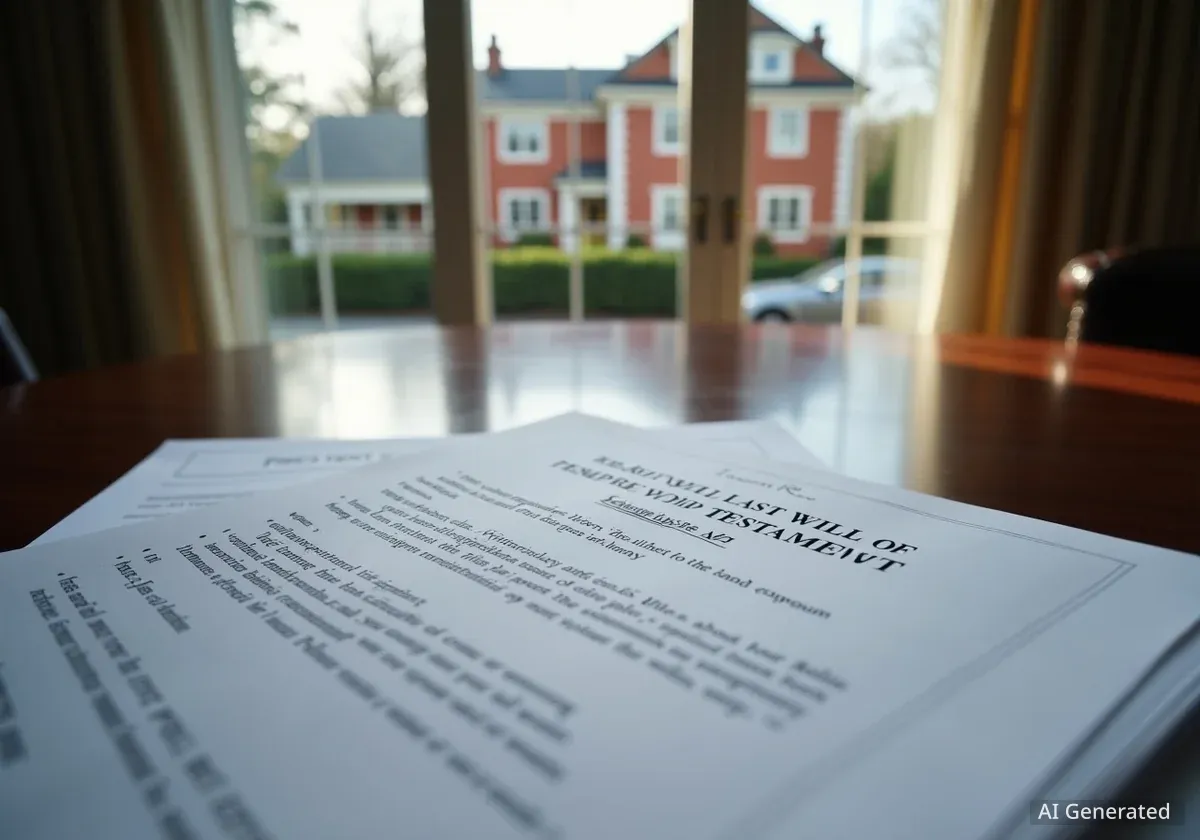Owning a vacation home in Massachusetts can create an unexpected financial burden for heirs, even if the owner lives in another state. Many out-of-state property owners are unaware that their estates could be subject to the Massachusetts estate tax, a liability triggered by the value of their total worldwide assets.
This tax applies if an individual's total estate exceeds a specific threshold, leading to a complex calculation and potential delays in selling the Massachusetts property after their death. Understanding these rules is essential for proper estate planning.
Key Takeaways
- Nonresidents owning real estate in Massachusetts may be subject to the state's estate tax.
- A Massachusetts estate tax return is required if the decedent's total worldwide estate exceeds $2 million.
- The tax is calculated proportionally based on the value of the Massachusetts property relative to the total estate.
- An automatic tax lien is placed on Massachusetts real estate upon the owner's death, preventing its sale until the tax liability is settled.
- Planning strategies, such as using LLCs or trusts, can help manage or mitigate this tax obligation.
Understanding the Massachusetts Estate Tax
The Massachusetts estate tax is a tax imposed on the transfer of a person's assets after they die. The state calculates this tax based on the total value of the decedent's taxable estate, which includes all property, investments, and other assets they owned, minus any allowable deductions.
For an estate to be subject to this tax, its total value must exceed a certain limit. Massachusetts currently has a $2 million estate tax exemption. This means that if the total value of a person's estate is less than $2 million at the time of their death, no Massachusetts estate tax is generally owed, and a tax return is not required.
However, if the estate's value surpasses the $2 million threshold, a tax is assessed. For Massachusetts residents, the tax is calculated on the value of the estate that exceeds the exemption, with rates ranging from 7% to 16%.
How the Tax Affects Nonresidents
The rules change for individuals who are not residents of Massachusetts but own property there. For these nonresidents, Massachusetts imposes its estate tax on the value of real estate and tangible personal property physically located within the state.
The key factor is the value of the decedent's entire worldwide estate. If this total value is more than $2 million, a Massachusetts estate tax return must be filed, even if the Massachusetts property itself is worth less than that amount.
The Proportional Calculation Method
Massachusetts uses a proportional method to determine the tax owed by a nonresident's estate. The calculation involves several steps to ensure the tax is based only on the portion of the estate located within the state.
First, the state calculates the total estate tax that would have been due if the decedent were a Massachusetts resident with the same total worldwide assets. Then, this hypothetical tax amount is multiplied by a fraction representing the value of the Massachusetts property divided by the value of the total estate.
Example Calculation
- Scenario: A Florida resident dies with a total estate of $10 million.
- Massachusetts Asset: A vacation home in Cape Cod valued at $2 million.
- Proportion: The Massachusetts property represents 20% of the total estate ($2 million ÷ $10 million).
- Step 1: Massachusetts calculates the tax on the full $10 million estate, which would be approximately $1,067,600.
- Step 2: This amount is multiplied by the 20% proportion, resulting in a preliminary tax of $213,520.
- Step 3: A tax credit for the exemption (currently $99,600) is subtracted.
- Final Tax Owed: The estate owes approximately $113,920 to Massachusetts.
The Automatic Lien on Massachusetts Property
One of the most significant consequences of the Massachusetts estate tax for nonresidents is the automatic lien placed on real estate. The moment a property owner dies, the Commonwealth of Massachusetts automatically imposes an estate tax lien on their Massachusetts property.
This lien serves as security to ensure that any potential estate tax is paid. It exists regardless of whether a tax is actually owed. The presence of this lien has serious practical implications for the heirs who inherit the property.
Why You Cannot Simply Sell the Property
The estate tax lien effectively freezes the property's title. Heirs cannot sell or transfer the property to a new owner until the lien is officially released by the state. This process requires several steps:
- Filing a Massachusetts estate tax return (Form M-706 for nonresidents).
- Paying any estate tax that is determined to be due.
- Receiving a Release of Estate Tax Lien (Form M-792) from the Massachusetts Department of Revenue.
Failure to file the return can lead to significant delays in administering the estate. It can also result in substantial penalties and interest charges accruing on any unpaid tax liability.
What is a Lien?
A lien is a legal claim or right against assets that are typically used as collateral to satisfy a debt. In this case, the Massachusetts property itself is the collateral for the potential estate tax debt. Until the state confirms no tax is owed or the tax is paid, the lien remains, clouding the property's title and preventing a clean transfer of ownership.
Proactive Planning for Nonresident Owners
Given the complexities and potential costs, nonresidents who own property in Massachusetts should consider proactive estate planning. Engaging with a trusts and estates attorney familiar with Massachusetts law is a critical step. An attorney can review the owner's specific situation and recommend strategies to address the potential estate tax liability.
"Nonresidents should engage a Massachusetts trusts and estates attorney to review possible planning strategies to address the Massachusetts estate tax or remove the asset from their Massachusetts taxable estate," advises Philip Tizzano, an attorney with McLane Middleton’s Trusts and Estates department.
Several planning techniques can be used to manage or potentially eliminate this tax burden. The suitability of each strategy depends on the individual's financial situation and personal goals.
Common Planning Strategies
Legal experts often suggest a few common approaches for nonresidents to consider:
- Transferring Property to an LLC: By transferring the real estate into a Limited Liability Company (LLC), the asset owned at death is no longer real property. Instead, it is an intangible interest in the LLC. Generally, intangible assets are not subject to the Massachusetts estate tax for nonresidents.
- Gifting Property to an Irrevocable Trust: Another strategy is to gift the property to an irrevocable trust. This removes the asset from the owner's taxable estate entirely, provided the gift is made correctly and the owner does not retain certain rights or controls over the trust.
Each of these strategies involves legal and financial complexities. They should be implemented with guidance from qualified professionals to ensure they are executed correctly and achieve the desired outcome of minimizing tax exposure and simplifying the estate administration process for heirs.





